Death toll from 4 days of rains rises to 63 in Pakistan with more rain on the forecast
RIAZ KHAN
Updated Wed, April 17, 2024
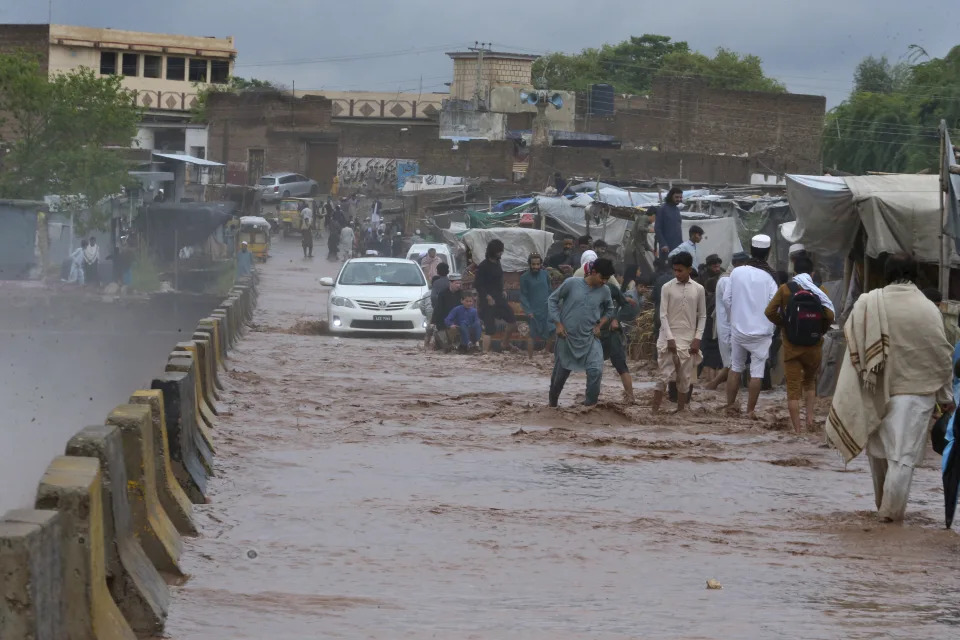
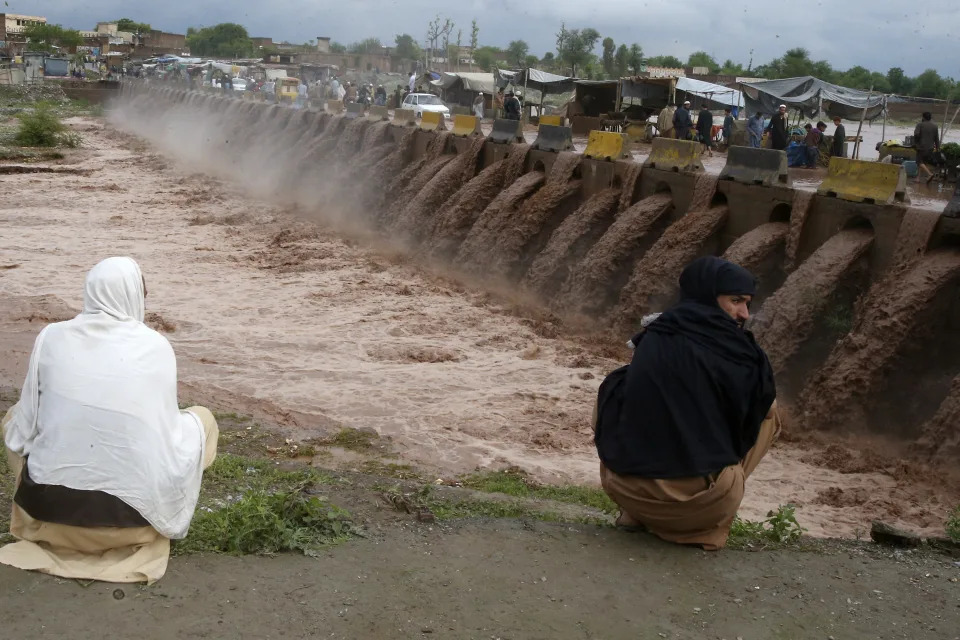
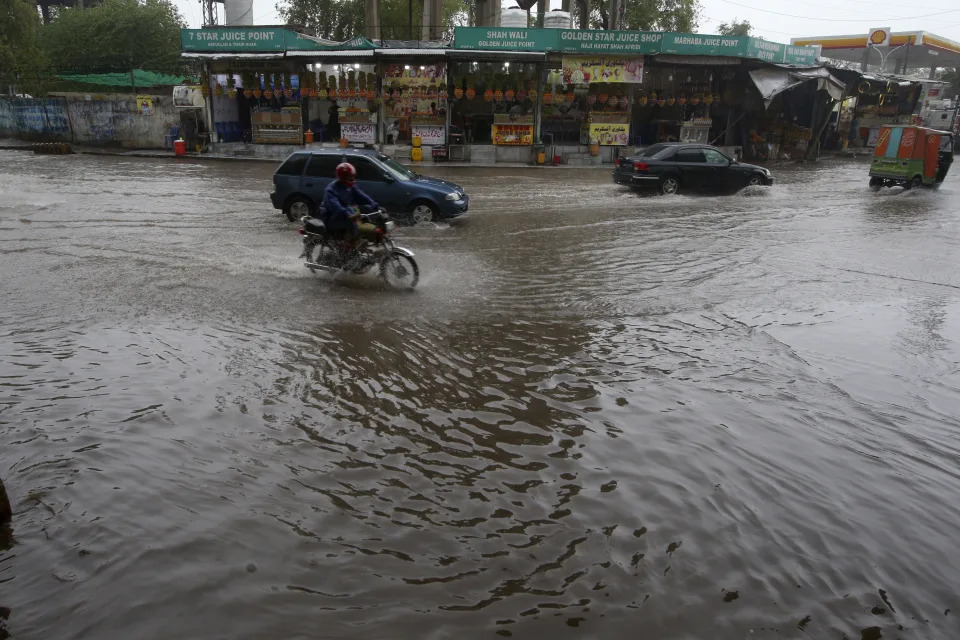
A motorcyclist and car drivers drive through a flooded road caused by heavy rain in Peshawar, Pakistan, Monday, April 15, 2024. Lightening and heavy rains killed dozens of people, mostly farmers, across Pakistan in the past three days, officials said Monday, as authorities declared a state of emergency in the country's southwest following an overnight rainfall to avoid any further casualties and damages. (AP Photo/Muhammad Sajjad)
PESHAWAR, Pakistan (AP) — Lightning and heavy rains led to 14 deaths in Pakistan, officials said Wednesday, bringing the death toll from four days of extreme weather to at least 63, as the heaviest downpour in decades flooded villages on the country's southwestern coast. Flash floods have also killed dozens of people in neighboring Afghanistan.
In Pakistan, most of the deaths were reported from Khyber Pakhtunkhwa province, in the country's northwest. Collapsing buildings have killed 32 people, including 15 children and five women, said Khursheed Anwar, a spokesman for the Disaster Management Authority. Dozens more were also injured in the region, where 1,370 houses were damaged, Anwar said.
The eastern province of Punjab has reported 21 lighting- and collapse-related deaths, while Baluchistan, in the country's southwest, reported 10 dead as authorities declared a state of emergency following flash floods.
On Wednesday, Baluchistan was bracing for more rains amid ongoing rescue and relief operations, as flash floods inundated villages near the coastal city of Gwadar.
Heavy rains also came down on the disputed Himalayan region of Kashmir. Authorities said a new spell of heavy rain is set to hit many areas, including the capital Karachi.
Pakistan is seeing heavier rain in April due to climate change, said Zaheer Ahmed Babar, a senior official at the Pakistan Meteorological Department.
“This month, so far there has been 353% more rainfall than normal in Baluchistan," Babar told The Associated Press. “Overall, rainfall has been 99% higher than the average across Pakistan, and it shows climate change has already happened in our country.”
Babar said Khyber Pakhtunkhwa province witnessed 90% more rain than usual in April, although rainfall in other parts of the country has remained relatively normal. It has been the wettest April in the past 30 years.
In 2022, downpours swelled rivers and at one point flooded a third of Pakistan, killing 1,739 people. The floods also caused $30 billion in damages, from which Pakistan is still trying to rebuild. Baluchistan saw rainfall at 590% above average that year, while Karachi saw 726% more rainfall than usual.
Meanwhile, the death toll in neighboring Afghanistan rose to 70 after 37 more people died from various rain and flash flooding incidents in recent days, according to Abdullah Janan Saiq, the Taliban’s spokesperson for the State Ministry for Natural Disaster Management.
Flash floods have also damaged 2,000 homes, three mosques, four schools and affected thousands of people who will need humanitarian assistance, he said. Floods also damaged agriculture land and 2,500 animals died from the deluges, Saiq said.
___
Associated Press writers Rahim Faiez in Islamabad and Abdul Sattar in Quetta, Pakistan contributed for this story.
Pakistan: Lightning and unusually heavy rain kill dozens
Kelly Ng - BBC News
Tue, April 16, 2024
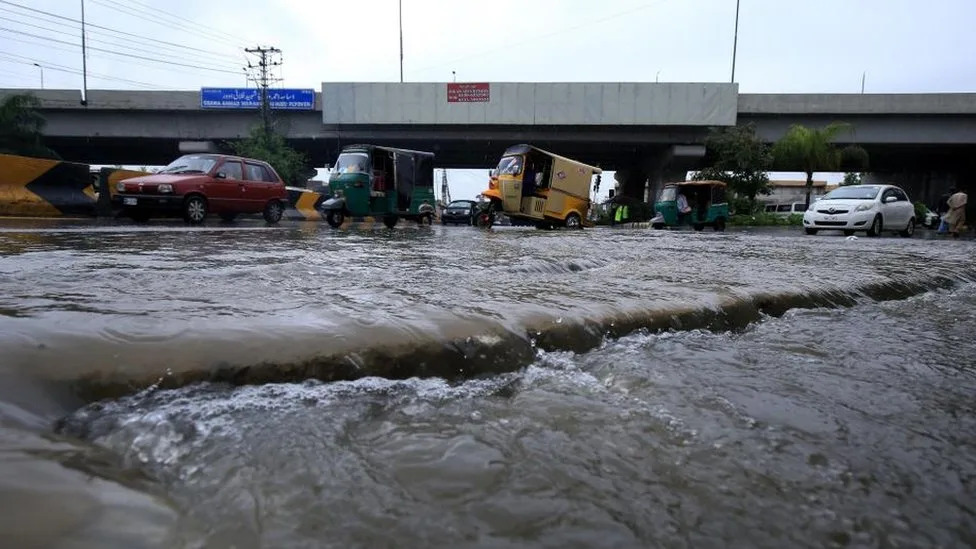
With more rain expected in the coming days, Pakistani authorities have also warned of landslides and flash floods [EPA]
At least 39 people have been killed in Pakistan after days of unusually heavy rains battered the country's southwest.
Some of those killed were farmers struck by lightning while harvesting wheat, authorities said.
Images online show swathes of farmland engulfed by rainwater. Flash floods have also disrupted power supplies and transportation networks.
Pakistan has experienced an increase in extreme weather events, as it grapples with the impacts of climate change.
In 2022, parts of the country were completely submerged by unprecedented flooding, killing more than 1,700 people and injuring thousands. Millions were left homeless and lacked clean drinking water for months after.
Some of the areas affected by the 2022 floods, including Khyber Pakhtunkhwa and Balochistan, are being impacted again by the recent storms.
With more rain expected in the coming days, Pakistan's National Disaster Management Authority has also warned of landslides and flash floods.
Pakistan floods: 'It's like fighting a war with no end'
Pakistan floods 'likely' made worse by warming
Pakistan's most populated province Punjab has suffered the highest death toll so far, with 21 people killed by lightning between Friday and Sunday, AFP news agency reported.
At least eight were killed in the westernmost Balochistan province according to AFP, where authorities have declared a state of emergency. Schools in the province were ordered to shut on Monday and Tuesday.
Extensive areas of Pasni, a Baloch coastal town, have been covered by rainwater.
"Pasni looks like a big lake at the moment as flash floods entered the human settlements and main commercial areas," Noor Ahmed Kalmati, chairman of the town's municipal committee, told Pakistan newspaper Dawn.
Heavy flooding has also been reported in neighbouring Afghanistan. At least 33 people have been killed and hundreds of homes damaged or destroyed, Afghan authorities said on Sunday.
Scientists have said that global warming is likely to have played a role in the devastating floods that hit Pakistan in 2022. Pakistan is also ranked as the fifth most vulnerable country to climate change, according to the UN's Global Climate Risk Index.
More than 100 killed across Pakistan and Afghanistan as flash floods and heavy rains sweep the region
Sophia Saifi, Asim Khan, Masoud Popalzai, Irene Nasser and Kathleen Magramo,
CNN
Wed, April 17, 2024
Unseasonal rainfall has lashed Pakistan and Afghanistan over the past few days, killing more than 100 people across the neighboring countries, authorities said.
In Afghanistan, heavy rain and floods in 23 provinces killed 66 people and wounded 36 others, according to preliminary reports from Mullah Janan Sayeq, a spokesman for the Ministry of Disaster Management.
Sayeq added that 600 animals died, and more than 1,200 houses have either been fully or partially destroyed in the deluge.
The United Nations Office for the Coordination of Humanitarian Affairs in Afghanistan said Tuesday that the heavy rains and floods have affected more than 1,200 families and damaged almost 1,000 houses, according to a statement on X.
More than 63,000 acres of land has been damaged, and the statement added that the UN and its partners are “assessing the impact and related needs and providing assistance.”
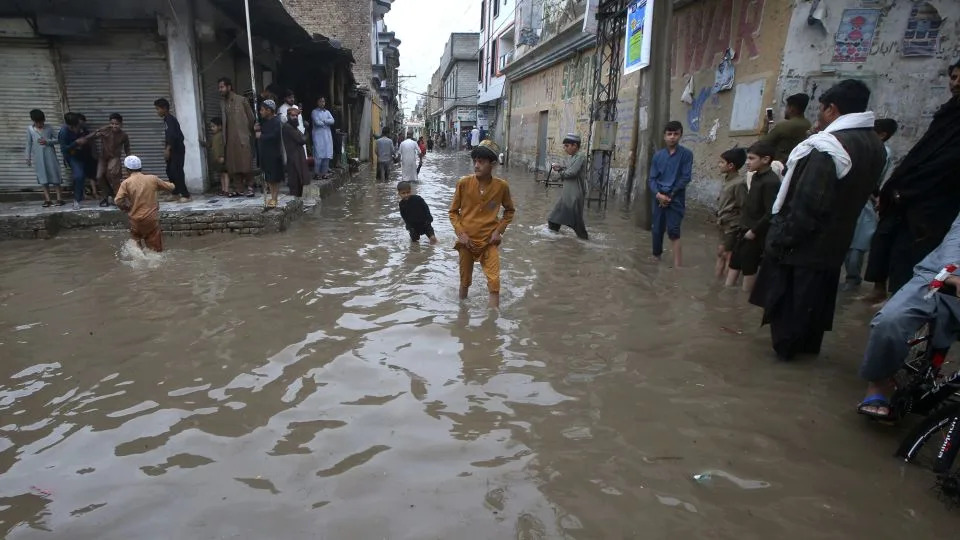
People wade through a street flooded by heavy rain in Peshawar, Pakistan on April 15, 2024. - Muhammad Sajjad/AP
Afghanistan has been reeling from years of conflict and natural disasters – last year alone, more than 150 people died from the harsh winter cold wave followed by dozens of deaths due to flash floods. Last October, a deadly 6.3 magnitude earthquake rattled its western Herat province, killing over 2,000 people.
The impoverished country has plunged deeper into an economic and humanitarian crisis ever since the Taliban took over in August 2021, and getting aid into the country has been difficult.
Several major foreign aid groups suspended their operations in the country late 2022 when the hardline Islamist group ordered all local and international non-governmental organizations to stop their female employees from working there.
The ongoing severe rain is also wreaking havoc in bordering Pakistan, where 32 people have died in the northwestern province of Khyber Pakhtunkhwa, according to a report released by the provincial disaster management authority.
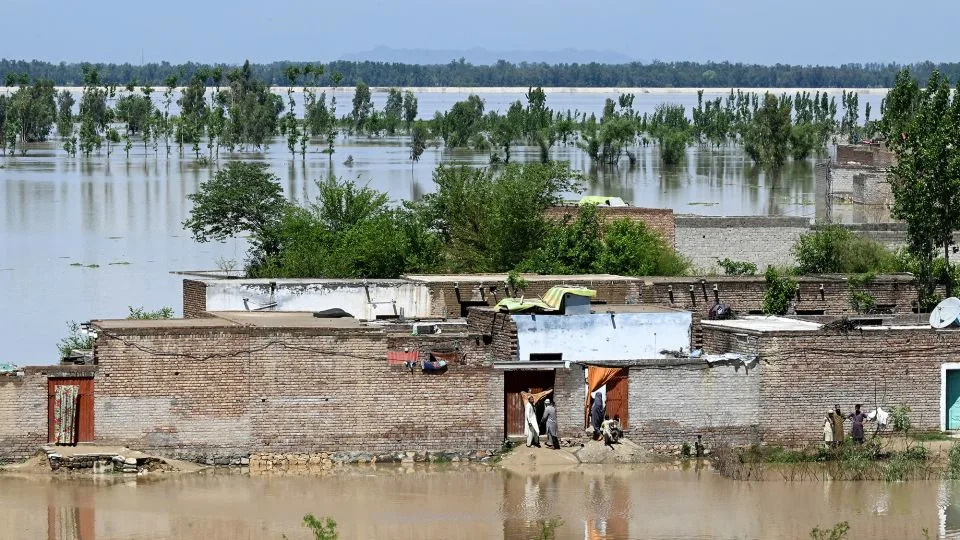
Houses submerged after heavy rains flood Nowshera district, Khyber Pakhtunkhwa province on April 16, 2024. - Abdul Majeed/AFP/Getty Images
Eight more people died in the southwestern province of Balochistan, according to provincial authorities.
Nearly 170 houses were completely destroyed and more than 1,250 partially damaged, local authorities said, while the country’s meteorological office warned of more rainfall in Balochistan on Wednesday, extending to the rest of Pakistan on Thursday.
The heavy downpours are unusual for the region at this time of the year, as Pakistan typically experiences the monsoon season from June through September.
Pakistan ranks as one of the most climate-vulnerable nations in the world even though it is responsible for less than 1% of the world’s plant-warming emissions.
The South Asian country has faced dramatic climate conditions, including record heatwaves and catastrophic floods that submerged one-third of the country in 2022 – as the climate crisis exacerbates extreme weather events.

Heavy rains, lightning kill 50 people across Pakistan
DPA
Tue, April 16, 2024
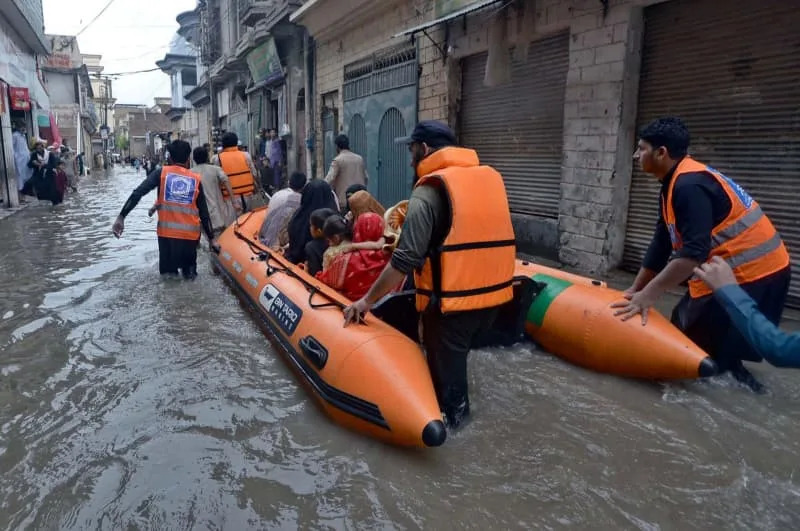
Volunteers from the Alkhidmat Foundation assist people after torrential rain, thunderstorms, and lightning caused havoc nationwide. -/PPI via ZUMA Press Wire/dpa
Pakistani authorities have put rescue services on high alert after heavy rains, thunderstorms and lightning wrought havoc across the country.
The National Disaster Management Authority (NDMA) has asked emergency services to be vigilant as more severe weather moves in.
The death toll from the heavy rains over the past four days has risen to 50, according to officials from provincial wings of the authority on Tuesday.
At least 21 people, including seven children, were killed when lightning struck in central Punjab province.
Another 21 people were killed in the north-western province of Khyber Pakhtunkhwa. At least eight perished in the southern province of Balochistan.
The weather has put the harvesting of wheat crops on hold in Punjab. It is feared that the upcoming spell of rains starting from Thursday will not only further delay the harvesting but will also do damage to the crop.
Heavy rainfalls, thunderstorms and flooding is unusual in the South Asian region, one of the most populous in the world, outside of the monsoon season between July and September.
Pakistan is responsible for less than 1% of global carbon emissions, but is among the top 10 most climate-vulnerable nations.
More than 2,000 people were killed by catastrophic floods and subsequent outbreak of diseases in Pakistan in 2022 when a third of the country was submerged, affecting 33 million people.












































